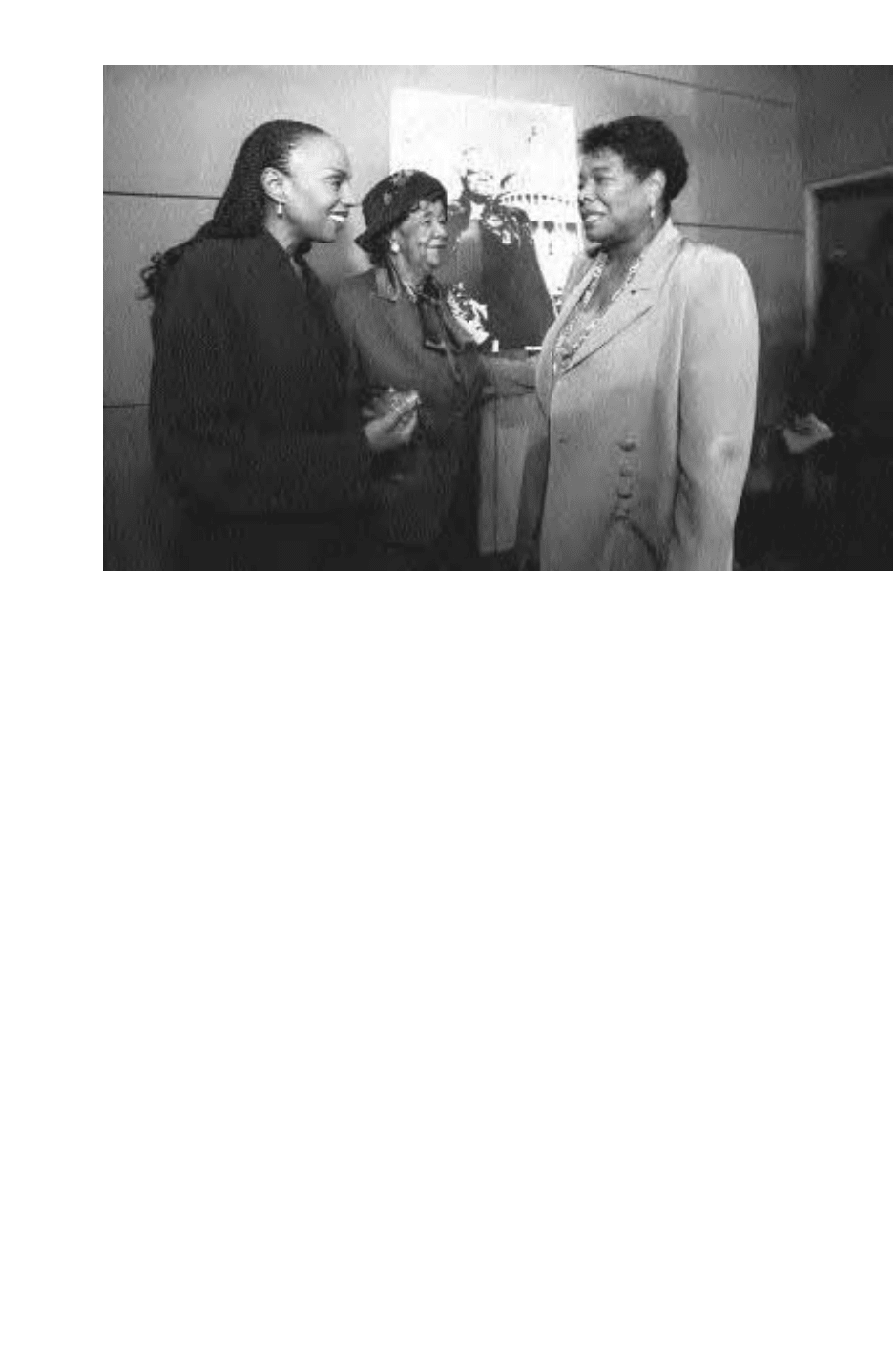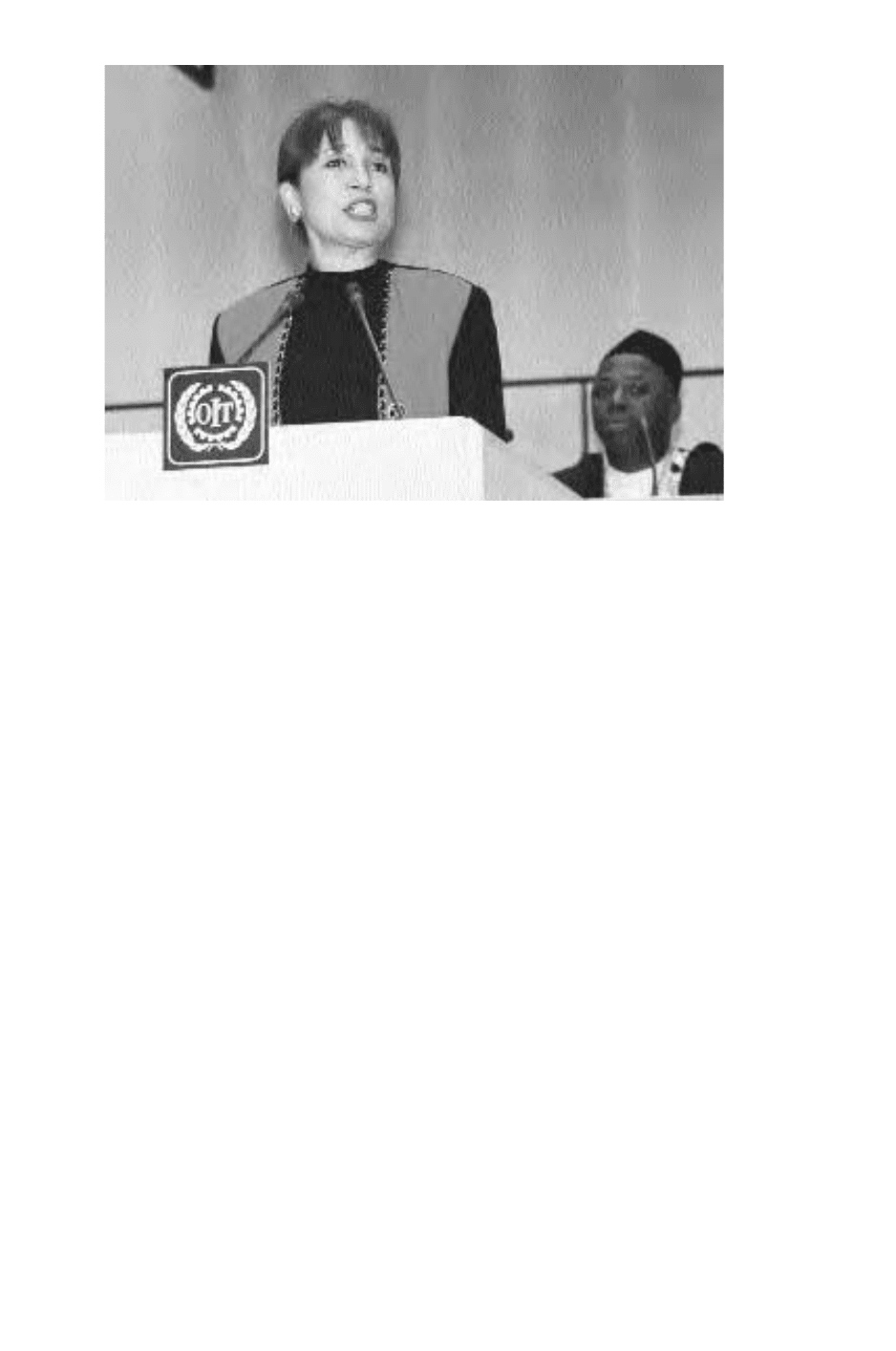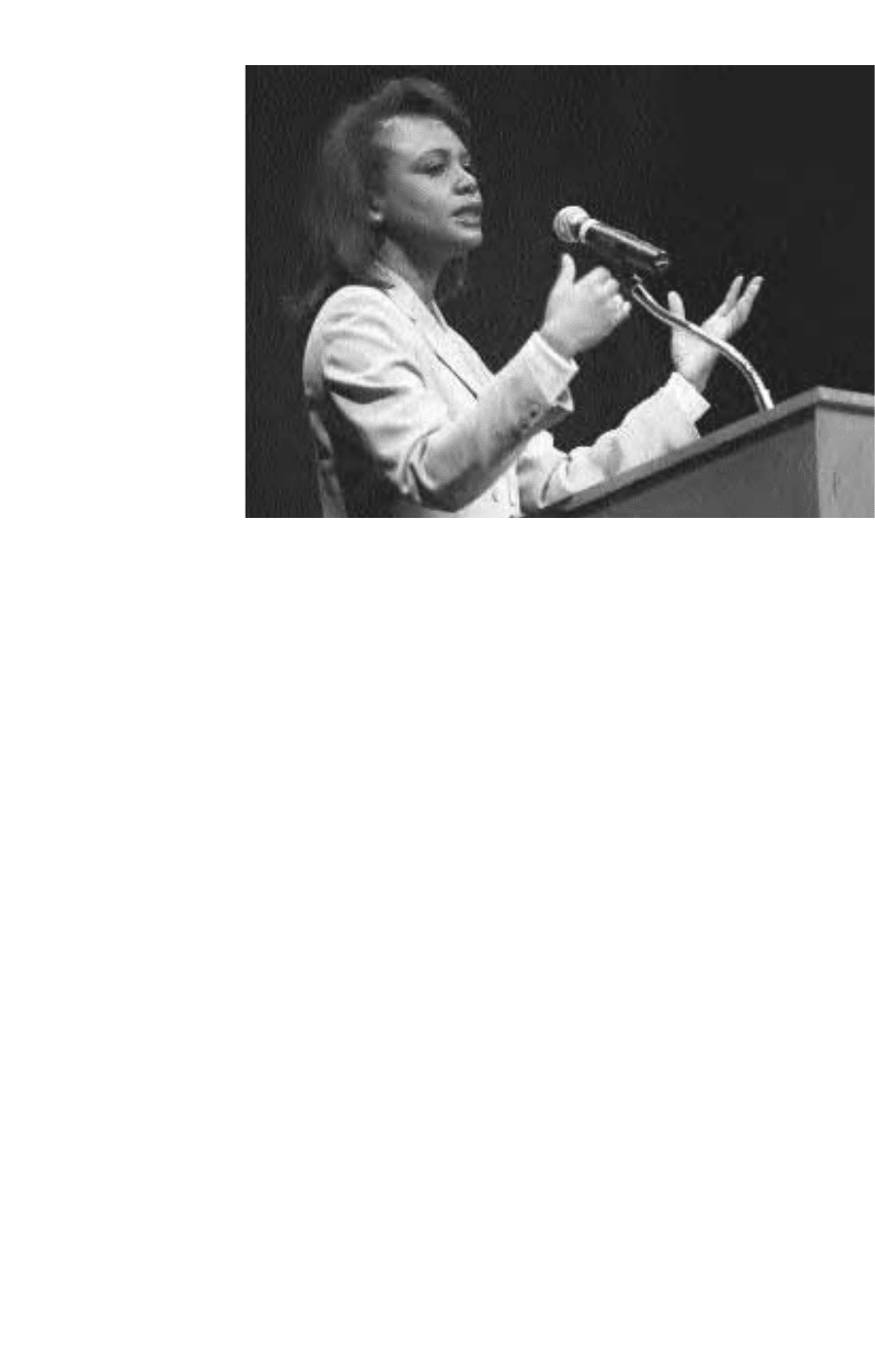Schenken Suzanne O’Dea. From Suffrage to the Senate: An Encyclopedia of American Women in Politics (2 Volumes)
Подождите немного. Документ загружается.


health hazards, concerns about the drug’s risk grew. Some medical au-
thorities advised against using it, whereas others argued that it was safe.
The Pill, unpleasant experiences with physicians, and other factors con-
tributed to women’s wanting explanations of medical terms and proce-
dures and more information about their bodies and health care alterna-
tives. Women read medical journals and other medical sources, formed
discussion groups to share their knowledge, and established clinics. The
Boston Women’s Health Clinic published Our Bodies, Ourselves in 1969
and gave new energy to women’s quest to understand and control their
own bodies.
A variety of women’s health issues emerged as visible political issues
in 1986 when the Congressional Caucus for Women’s Issues (CCWI) chal-
lenged health research priorities and practices and sought remedies for the
exclusion of women and minorities from clinical studies of drugs and other
medical treatments. In 1990, CCWI introduced the Women’s Health Equity
Act, parts of which passed Congress that year and in subsequent years.
The National Breast Cancer Coalition emerged as a powerful lobby
in the early 1990s, dramatically increasing research funding for the dis-
ease. In 1991, the group sought to generate 175,000 letters to Congress
and the president, choosing the number because it represents the number
of women annually diagnosed with breast cancer. They surpassed their
goal, and 600,000 letters supporting breast cancer research went to mem-
bers of Congress and the president. The letters of support helped increase
funding to $145 million for 1992, about $52 million more than in 1991,
or a 55 percent increase. In 1993, the coalition succeeded in increasing the
appropriation by $325 million, an increase of 160 percent over 1992.
See also Abortion; Congressional Caucus for Women’s Issues; Dennett, Mary
Coffin Ware; Roe v. Wade; Sanger, Margaret Louise Higgins; Women’s Health
Equity Act
References Bingham, Women on the Hill: Challenging the Culture of Congress
(1997); Congressional Quarterly Almanac, 103rd Congress, 1st Session...1993
(1994); Linden-Ward and Green, American Women in the 1960s: Changing the
Future (1993).
Heckler, Margaret Mary O’Shaughnessy (b. 1931)
Republican Margaret Heckler of Massachusetts served in the U.S. House
of Representatives from 3 January 1967 to 3 January 1983. Heckler was
secretary of health and human services from 1983 to 1985 and ambassa-
dor to Ireland from 1985 to 1989. As a member of Congress, Heckler
worked for federal funding of child day care for low-income families,
sought to protect the pension rights of employed women on maternity
leave, and advocated establishing shelters for victims of domestic violence.
Heckler, Margaret Mary O’Shaughnessy 325

A leading proponent of the Equal Rights Amendment, she cosponsored
the measure to extend the deadline for its ratification. With Congress-
woman Elizabeth Holtzman (D-NY), she founded the Congresswoman’s
Caucus, later known as the Congressional Caucus for Women’s Issues, in
1977 and served as its cochair for five years. Heckler lost the race for a
ninth term.
President Ronald Reagan appointed her secretary of health and hu-
man services in 1983. In that office, Heckler established new guidelines for
Social Security disability programs, campaigned to increase funding for
research and patient care for people with acquired immunodeficiency
syndrome (AIDS) and Alzheimer’s disease, and supported tax credits for
day care.
Born in Flushing, New York, Heckler studied at the University of Lei-
den in the Netherlands in 1952, earned her bachelor’s degree from Alber-
tus Magnus College in 1953, and received her law degree from Boston
College Law School in 1956. Heckler entered politics as a member of the
Wellesley Town Meeting, serving from 1958 to 1966.
See also Abortion; Cabinets, Women in Presidential; Congress, Women in;
Congressional Caucus for Women’s Issues; Equal Rights Amendment;
Holtzman, Elizabeth
References H. W. Wilson, Current Biography Yearbook, 1983 (1983); Office of the
Historian, U.S. House of Representatives, Women in Congress, 1917–1990
(1991).
Height, Dorothy Irene (b. 1912)
President of the National Council of Negro Women (NCNW) for more
than forty years, Dorothy Height has been an advocate for women’s rights
and African American rights. An adviser to Eleanor Roosevelt and a civil
rights strategist, Height’s leadership extended from the neighborhood to
the international levels.
Born in Richmond, Virginia, Height earned a college scholarship by
winning a national oratorical contest sponsored by the Elks Club. Height
applied to Barnard College, but the school told her that it already had two
African American students and that she would have to wait a term for ad-
mission. Accepted at New York University, she earned her bachelor’s and
master’s degrees there and later studied at the New York School of Social
Work .
In 1937 Height joined the Young Women’s Christian Association’s
(YWCA) staff at its Harlem branch and NCNW, two associations that
worked together to enhance her effectiveness as a civil rights advocate. A
leader in both organizations, she became a member of the YWCA’s na-
tional board in 1944. Height led the YWCA’s campaign to integrate pub-
326 Height, Dorothy Irene

lic swimming pools in the early 1960s, helped develop and was director of
the YWCA’s Center for Racial Justice, and directed a voter registration
drive sponsored by the YWCA and a New York City radio station. She
worked to bring black and white women together in several Alabama
communities, hoping that talking to each other might help them work to-
gether. Height retired from the YWCA in 1977.
Elected NCNW president in 1957, she gained tax-exempt status for
the organization, a change that helped it attract large foundation grants.
Also under her leadership, NCNW established the Mary McLeod Bethune
Museum and Archives for Black Women’s History and led the campaign
to erect the Bethune statue in Washington, D.C., the first memorial to an
African American in that city. Height organized Black Family Reunion
celebrations to affirm the importance of strengthening black families and
expanded NCNW programs to include child care centers in urban and ru-
ral areas, housing initiatives, health care, and career education for girls.
She retired from the NCNW presidency in 1997.
Height has testified before congressional committees in a wide range
of areas, including the Economic Opportunity Act of 1964, the war on
poverty, the Economic Opportunity Act Amendments of 1967, housing
legislation, Social Security and welfare proposals, extension of the ratifi-
cation deadline for the Equal Rights Amendment, teen pregnancy, and
racism in National Football League field management, recruitment, and
hiring practices. National president of Delta Sigma Theta sorority from
Height, Dorothy Irene 327
Dorothy Height
(center), president of
the National Council
of Negro Women,
talked with Susan
Taylor, editor of
Essence magazine,
and poet Maya
Angelou at a national
teleconference, 1997
(Associated Press AP)

1947 to 1956, Height was a founder of the National Women’s Political
Caucus in 1971.
See also Bethune, Mary Jane McLeod; Delta Sigma Theta Sorority; Equal Rights
Amendment; National Council of Negro Women; National Women’s Political
Caucus; YWCA of the USA
References Hardy, American Women Civil Rights Activists (1993); Hine, ed.,
Black Women in America (1993); New York Times, 13 August 1979;
www.ncnw.com.
Herman, Alexis Margaret (b. 1947)
Alexis Herman became secretary of labor in 1997, the first African Amer-
ican to hold the position and the highest-ranking African American
woman in President Bill Clinton’s cabinet. She began her public service
career as director of the Women’s Bureau in 1977, making her the senior
black woman in the Labor Department. She was also the youngest direc-
tor in the bureau’s history. Herman focused her efforts on eliminating dis-
crimination based on gender, age, and race. She believed that the prob-
lems facing women included limited marketable job skills, the availability
of child care, and rigid work schedules. After Ronald Reagan’s election, she
left government service and in 1981 started her own consulting firm to
help businesses comply with affirmative action training programs.
She worked in Jesse Jackson’s 1984 and 1988 presidential campaigns,
coordinating his activities at each Democratic National Convention
(DNC). DNC chairman Ron Brown appointed her his chief of staff in
1989 and then deputy party chairwoman, a position she held until 1991.
As chief executive officer of the 1992 DNC Committee, Herman’s man-
agement of the convention contributed to Bill Clinton’s increased popu-
larity immediately after he received the party’s presidential nomination.
Following Clinton’s election in 1992, Herman became deputy direc-
tor of the Clinton-Gore Presidential Transition Office. Appointed assis-
tant to the president, director of the Public Liaison Office, she provided a
link between the White House and the public and worked with several
special interest groups. Herman’s ability to work with disparate groups
and to bring them together on issues contributed to her selection as sec-
retary of labor in 1997. Her priorities include increasing the number of
job-retraining programs, welfare-to-work programs involving businesses,
and company-based child day care centers as well as implementing pen-
sion reform and new initiatives in job safety.
Born in Mobile, Alabama, Herman attended Heart of Mary Roman
Catholic High School, a school for African Americans. During her sopho-
more year, she confronted a diocesan official and asked him to explain the
reasons her school did not have the same annual religious pageant that
328 Herman, Alexis Margaret

was held at the white schools in the diocese. The school suspended her for
the question but readmitted her after parents of other African American
students protested. Herman earned her bachelor’s degree from Xavier
University in 1969 and did graduate work at the University of South Al-
abama from 1970 to 1972. After graduating from college, Herman re-
turned to Mobile and helped desegregate the city’s parochial schools.
See also Affirmative Action; Cabinets, Women in Presidential; Women’s Bureau
References H. W. Wilson, Current Biography Yearbook, 1998 (1998); New York
Times, 31 August 1994, 21 December 1996.
Hernandez, Aileen Clarke (b. 1926)
The first woman appointed to the Equal Employment Opportunity Com-
mission (EEOC), African American Aileen Hernandez was a founder and
the second president of the National Organization for Women (NOW)
and a founder of the National Women’s Political Caucus. Hernandez be-
gan her civil rights activism in the mid-1940s, picketing the National The-
ater, Lisner Auditorium, and a restaurant chain to protest segregation.
From 1951 to 1961, she worked for the International Ladies’ Garment
Workers Union (ILGWU) as an organizational assistant, assistant educa-
tional director, and director of public relations and education. She was as-
sistant chief of the California Fair Employment Practices Commission
from 1962 to 1965.
In 1965, President Lyndon Johnson appointed Hernandez to the
EEOC, created the year before as part of Title VII of the Civil Rights Act
of 1964 to enforce prohibitions against employment discrimination on
Hernandez, Aileen Clarke 329
Secretary of Labor
Alexis Herman was
the first African
American to hold the
position, 1997
(Associated Press AP)

the basis of race, color, religion, national origin, or sex. She played a piv-
otal role in changing airline companies’ policy of firing stewardesses when
they married, but she privately acknowledged that the EEOC was weak
and that women needed an organization comparable to the National As-
sociation for the Advancement of Colored People. She explained: “Behind
the scenes, I was actively involved in getting women’s organizations
protesting some of the things that were not happening at the commission.”
After eighteen months, Hernandez left the commission out of frustration
with the poor progress made in enforcing laws against discrimination.
A founding member of NOW, Hernandez served as executive vice
president of the organization from 1966 to 1970 and as president from 1970
to 1971. She was elected executive vice president, effective after the date of
her resignation from the EEOC. She saw the repeal of abortion laws, free
day care centers, equal employment opportunities, and passage of the Equal
Rights Amendment (ERA) as the organization’s priorities. In 1970 and
1971, Hernandez appeared before congressional committees in support of
the ERA and in 1973 offered testimony on women’s economic problems.
Hernandez said that NOW had an “embarrassingly elitist and mid-
dle-class image,” one that she hoped to change by addressing problems
confronting low-income women and women in menial jobs. After leaving
the presidency, she created the Minority Women’s Task Force in 1972 and
organized a minority women’s survey. The survey highlighted the sense of
isolation felt by minority women that she had articulated.
Born in Brooklyn, New York, Hernandez earned her bachelor’s de-
gree in political science and sociology from Howard University in 1947
and graduated from the ILGWU labor college in 1951. She also attended
the University of Oslo in Norway, New York University, the University of
California at Los Angeles, and the University of Southern California, re-
ceiving her master’s degree from Los Angeles State College in 1959.
See also Civil Rights Act of 1964, Title VII; Equal Employment Opportunity
Commission; Equal Rights Amendment; National Organization for Women;
National Women’s Political Caucus
References H. W. Wilson, Current Biography Yearbook, 1971 (1971); Hardy,
American Women Civil Rights Activists (1993); New York Times, 2 May 1970.
Hicks, (Anna) Louise Day (b. 1923)
Democrat Louise Hicks of Massachusetts served in the U.S. House of Rep-
resentatives from 3 January 1971 to 3 January 1973. Hicks started her po-
litical career as a member of the Boston School Committee in 1961, where
she opposed busing to integrate public schools. From 1963 until a court-
ordered plan went into effect in 1974, Hicks led Boston’s antibusing sup-
porters, insisting that she favored neighborhood schools. An unsuccessful
330 Hicks, (Anna) Louise Day

candidate for mayor of Boston in 1967, she was later elected to the Boston
City Council, serving from 1969 to 1971. As a member of Congress, Hicks
continued her opposition to school busing. She supported voluntary
school prayer and tax credits for students attending private schools and
worked for proposals to allow direct federal aid to low-income students
and to allow tax credits to parents of students attending nonpublic
schools. When her district was redrawn after reapportionment, she lost
her attempt for a second term.
Born in South Boston, Louise Hicks graduated from Wheelock
Teachers’ College in 1938 and taught elementary school for two years. She
completed her bachelor of science degree in education in 1955 at Boston
University and earned her law degree from Boston University School of
Law in 1958.
See also Congress, Women in
References Schoenebaum, ed., Political Profiles: The Nixon/Ford Years (1979).
Hill, Anita Faye (b. 1956)
Law professor Anita Hill became a national figure in October 1991 when
she accused U.S. Supreme Court nominee Clarence Thomas of sexually
harassing her when he was her boss. Her televised testimony before the
U.S. Senate’s Judiciary Committee brought sexual harassment to the na-
tion’s attention in unprecedented ways. In addition, the image of the com-
mittee of white men questioning an African American woman about the
experience outraged many women across the nation, motivating some of
them to become candidates for public office and resulting in record num-
bers of women serving in Congress following the 1992 elections.
Hill’s accusations stemmed from the years she had been Thomas’s as-
sistant, beginning in 1981, when he was assistant secretary for civil rights
in the U.S. Department of Education. Three months after they began
working together, Thomas suggested a social relationship, but Hill de-
clined because she did not want to mix her personal and professional lives
and she was not attracted to him. Thomas then began scheduling lunch
meetings with Hill and turned the topic to his sexual interests, topics that
Hill explained she did not want to discuss. Eventually, Hill had fewer per-
sonal conversations with Thomas, and his objectionable behavior stopped.
By 1982, Hill was concerned that the Department of Education would
be abolished and that her job would end. When Thomas was appointed
head of the Equal Employment Opportunity Commission (EEOC), he of-
fered Hill a position as his assistant, and she accepted it. Hill’s responsibil-
ities included reviewing the commission’s position on sexual harassment in
the workplace as part of its antidiscrimination enforcement mandate. In
Hill, Anita Faye 331

the process, Hill realized that the EEOC had pursued cases involving be-
havior similar to what she had endured. She did not discuss the matter
with Thomas because it embarrassed her. She did not file a charge against
him, believing that the outcome was uncertain. (The U.S. Supreme Court
did not decide that sexual harassment was sex discrimination until 1986.)
Later in 1982, Thomas resumed making comments containing sexual in-
nuendo to Hill.
When Hill received a job offer to teach at Oral Roberts University, it
appealed to her because it offered her an escape from Thomas. In 1986, Hill
accepted a teaching position at the University of Oklahoma College of Law.
When President George Bush nominated Thomas to the U.S.
Supreme Court in 1991, one of Senator Howard Metzenbaum’s aides re-
ceived a tip that Thomas had sexually harassed Hill when she had worked
for him in the 1980s. In response to an inquiry and because she had been
told that her response would be confidential, Hill prepared a statement
that was part of a report sent to Senate Judiciary Committee members.
During the Judiciary Committee’s hearings on Thomas’s nomina-
tion, Hill’s allegations were not considered. The committee voted seven to
seven on Thomas’s nomination and sent its report with no recommenda-
tion to the Senate. During Senate debate, Hill’s name and other material
were leaked to Newsday and to National Public Radio. On 6 October 1991,
when both news agencies made the information public, some observers
believed that President Bush would withdraw Thomas’s name after learn-
ing of the sexual harassment allegations Hill had made. Instead, Thomas’s
confirmation procedure continued.
332 Hill, Anita Faye
Anita Hill, whose
sexual harassment
allegations against
Clarence Thomas
nearly derailed his
appointment to the
U.S. Supreme Court,
discussed the Lewin-
sky scandal while at
the University of
Southern California,
1998 (Associated
Press AP)

On Tuesday, 8 October 1991, three Democratic senators used their
one-minute speeches to challenge and protest Thomas’s pending confir-
mation. Congresswoman Patricia Schroeder (D-CO) organized a group of
seven Democratic women members of the House to go to the Senate to
explain to senators their concerns regarding Thomas’s potential confir-
mation and their belief that the charges against him were serious. Televi-
sion cameras and newspaper photographers recorded the women’s march
on the Senate and sent the image across the nation. Their action, along
with public pressure, led to the Senate’s reopening of Thomas’s hearings.
From Friday, 11 October 1991, to Sunday, 13 October 1991, the Sen-
ate hearings on Hill’s allegations of Thomas’s sexual harassment captured
both the media’s and the public’s attention. Throughout the hearings, the
committee focused its questions on Hill’s integrity, her recollections, and
her veracity rather than on Thomas’s behavior or the general issue of sex-
ual harassment. Even though three other women had been identified as tar-
gets of sexual harassment by Thomas, the committee refused to call them
or an expert on sexual harassment as witnesses. The committee members’
seeming intent to discredit Hill outraged women across the country, who
viewed the committee’s questions as unwarranted attacks on Hill.
In unprecedented ways, however, the nation focused on the question
of sexual harassment, what constituted it, and what the consequences of it
should be. In the months following the hearing, the number of formal
sexual harassment complaints filed with the EEOC increased more than
50 percent. Women’s political organizations gained new members and re-
ceived increased financial support following the hearings. Several women
ran for and won political office, among them Carol Moseley-Braun, who
became the first African American woman to serve in the U.S. Senate, and
Cynthia McKinney, for whom Hill provided “a moral context” for her de-
cision to run for the U.S. House of Representatives.
Hill returned to teaching at the University of Oklahoma College of
Law, but she experienced a great deal of backlash from other professors
and even from the Oklahoma legislature, which tried to revoke her posi-
tion. She was a visiting professor at the University of California at Berke-
ley and eventually moved on to Brandeis University.
Born near Morris, Oklahoma, Anita Hill earned her bachelor of science
degree from Oklahoma State University in 1977 and her law degree from
Yale Law School in 1980. She was in private practice from 1980 to 1981.
See also Congress, Women in; Equal Employment Opportunity Commission;
McKinney, Cynthia Ann; Moseley-Braun, Carol; Schroeder, Patricia Nell Scott;
Sexual Harassment
References Boxer, Strangers in the Senate (1994); Hill, Speaking Truth to Power
(1997).
Hill, Anita Faye 333

Hills, Carla Helen Anderson (b. 1934)
Carla Hills served as U.S. secretary of housing and urban development from
March 1975 to January 1977 and as special trade representative from 1989 to
1993. Hills began her public service career in 1974 as assistant attorney gen-
eral in charge of the civil division of the Department of Justice, the highest-
ranking woman in the department. President Gerald Ford appointed her
secretary of housing and urban development in 1975, making her the third
woman to hold a cabinet-level position. A fiscal conservative, she focused on
rehabilitating existing housing for low- and moderate-income families
rather than on new construction. Hills generally opposed public housing,
characterized it as wasteful and expensive, and supported rent subsidies in-
stead. Hills served until 1977 and then went into a private law practice.
Hills returned to public life in 1989 when President George Bush ap-
pointed her U.S. trade representative. As President Bush’s principal ad-
viser on international trade policy and the nation’s chief trade negotiator,
she helped negotiate the North American Free Trade Agreement, the Gen-
eral Agreement on Tariffs and Trade, and agreements with Japanese com-
panies to open their markets to U.S. imports. During negotiations to limit
European governments’ assistance to farmers, the talks came to a stale-
mate and Hills threatened to impose prohibitive tariffs on French wines
and other products. Instead of the international trade war that observers
predicted, Hills negotiated an agreement acceptable to both the European
Community and the United States.
Born in Los Angeles, California, Hills studied at St. Hilda’s College in
Oxford, England, in 1954 and earned her bachelor’s degree from Stanford
University in 1955 and her law degree from Yale University in 1958.
See also Cabinets, Women in Presidential
References H. W. Wilson, Current Biography Yearbook, 1993 (1993); New York
Times, 14 February 1975, 7 December 1988, 18 December 1992; Schoenebaum,
ed., Political Profiles: The Nixon/Ford Years (1979).
Hishon v. King and Spalding (1984)
Elizabeth Hishon worked for King and Spalding, a large law firm that had
more than fifty partners and about fifty associate attorneys. The firm had
never had a woman partner in 1980, when Hishon filed her lawsuit ac-
cusing the firm of sex discrimination in violation of Title VII of the Civil
Rights Act of 1964. When she had been recruited in 1972 by the law firm,
she had been led to believe that, after five or six years, advancement to
partner was a matter of course for associates whose work was satisfactory.
After working for the firm for twelve years as an associate, she had not
been invited to become a partner, prompting the lawsuit. The district
334 Hills, Carla Helen Anderson
